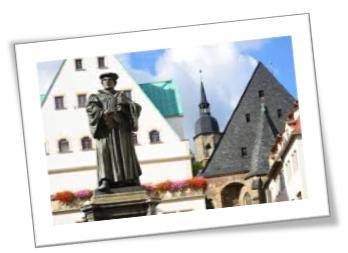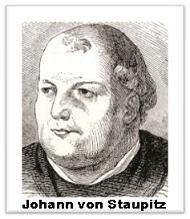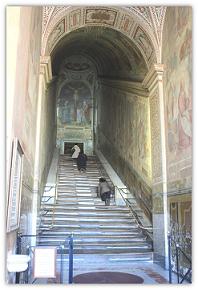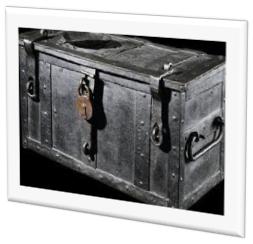Martin Luther: The "Father" of the Reformation
Martin Luther: The "Father" of the Reformation
On October 31 we commemorate the Reformation – not Halloween. God was pleased to use Martin Luther (1483-1546) in a special manner to usher in this mighty and blessed sixteenth century movement. Luther has rightly been denominated "the father of the Reformation" in the same sense that George Stephenson was "the father of the railways.'' By grace, he pioneered its initial and subsequent development. As Craftsman, God sovereignly chose Martin Luther as primary tool to recover the gospel of free grace, and to proclaim it throughout Europe by means of those who were discipled by him such as Melanchthon, Bucer, Cranmer, and Calvin. Today, we are beneficiaries of this rich inheritance.
Born on November 10, 1483, Martin Luther grew up in the midst of peasants in the small mining town of Eisleben in Saxony, Germany. Despite poverty, however, young Martin received a reputable education in school at Mansfield, Magdeburg, Eisenach, and Erfurt, graduating with an M.A. degree in 1505, well-versed in the philosophy and theology of the Middle Ages (e.g., Occam, Duns Scotus, Bonaventura, Thomas Aquinas), as well as in classical authors (e.g., Cicero, Virgil and Aristotle).
Throughout his school (especially college) years, Martin Luther experienced many impressions of conscience which fell short of saving convictions of heart. On one occasion, while returning from college to see his family, the blade of his sword fell out. It cut a major artery, and caused him to cry urgently to Mary for help in the face of death. Only a few weeks later, Alexis, Luther's closest friend, was suddenly assassinated. The thought naturally rose with power, "What would become of me, if I were thus called away without warning?" And, indeed, only a few months passed before Luther fell seriously ill, due to excessive study. His friends despaired of his life, while Luther could not hold back his fears of eternity. Nevertheless, an old priest deeply impressed him by declaring, "Martin, you will not die of this illness. Our God will yet make of you a man, who, in turn, shall console many."
The Lord resorted young Luther's life. Meanwhile he had discovered a Bible for the first time in his life at Erfurt in 1503, where he resorted frequently to absorb spiritual manna from this chained, unknown volume. These secret Bible-reading sessions continued periodically until July 2, 1505, when Luther was struck to the ground by lightning and cried to the patron saint of the miners of his youth, "St. Anne, help me! I will become a monk." Shaken by this thunderstorm experience, Luther quickly fulfilled his vow. Purposely, he entered the strict Augustinian monastery at Erfurt within two weeks.
In seclusion, Luther expected to find peace with God through conscientious exercises of monkish perfection. In this he was disappointed, though he persevered in training and was ordained a priest in 1507. Under the ministration of his first mass Luther experienced a second thunderstorm – a thunderstorm in soul. "I felt utterly stupefied and horror stricken," he later wrote, "for how could I speak to the holy and eternal God when but dust and ashes, and full of sin?"
Under the Holy Spirit's guidance, Luther's inner, spiritual struggle intensified. The question of how a man could abide God's presence unless perfectly holy himself continually plagued him; consequently, he set himself to the pursuit of absolute holiness. He practiced charity, sobriety, and the counsels of perfection – chastity, poverty, obedience, fasting and mortification of the flesh. He often fasted three days without a crumb. He slept without blankets, frequently at the risk of freezing to death. Being a bit proud of such sanctity, he often boasted within himself, "I have done nothing wrong today." Nevertheless, immediate misgivings would rise: "Have you fasted enough? Are you poor and holy enough to meet God?"
Despite rigid vigils and self-denying exercises, Luther could not satisfy God's justice nor make perfect compensation for sin. The harder he tried to live spotlessly holy, the more impossible his goal became. God was too holy; self, too sinful. On the brink of spiritual despair, Luther's body wasted severely. Dr. Staupitz, founder of the University of Wittenberg and vicar general of Germany's Augustinian monasteries, entreated Luther to open his heart and express his sorrow. Luther gladly did so.  To his fears, Staupitz replied that all human vows, confessions, and repentances would never be sufficient to appease God, for salvation was only to be found outside of himself in Jesus Christ, who loved His people before they loved Him. Staupitz pointed Luther to the wounds and blood of Christ, and advised him to search the Scriptures.
To his fears, Staupitz replied that all human vows, confessions, and repentances would never be sufficient to appease God, for salvation was only to be found outside of himself in Jesus Christ, who loved His people before they loved Him. Staupitz pointed Luther to the wounds and blood of Christ, and advised him to search the Scriptures.
Gradually, the more he studied Scripture in Latin, Greek and Hebrew, Luther came to realize that salvation was a gift of free grace and conversion was the work of God. Flesh and blood however, could not yet accept this, for Luther later wrote, "There still was no word more bitter to me than 'repentance'." Everything on his side was too short; his repentance needed to be repented of. Repeatedly, Luther paced his damp, dark cell, crying out, "Oh my sin, my sin, my sin!" Under weighty conviction, he eventually became very frail, and feared for his life. Anguish multiplied at the thought of death, until Staupitz returned to Luther's cell, and said simply, "I believe in the forgiveness of sins." These words were powerfully used by God to restore Luther to physical health, to grant him a glimmer of hope in the spiritual strife, and to follow him unforgettably throughout his career as Reformer.
Staupitz continued to assume personal interest in Luther. He arranged with the ruler of Saxony to have this young monk become professor of philosophy at Wittenberg University. Under pressure from Staupitz, Luther taught one semester of scholastic philosophy and subsequently assumed the duties of Bible lecturer and occasional preacher. Luther lectured on the Psalms and Romans, which God used to lead him progressively closer to the doctrines of grace; particularly Psalm 22:1 left an abiding impression upon him, "My God, my God, why hast Thou forsaken Me?" While lecturing, Luther saw as never before that the cross of divine wrath and divine mercy met in redeeming love.
But Luther still clung firmly to Rome. In 1510, when granted an opportunity to visit "the Eternal City" he immediately went for he longed to find unadulterated godliness and personal assurance of salvation. In both desires he was bitterly disconcerted. Rome abounded in secularization, formalism, indifference and corruption.  Having so earnestly longed to climb Pilate's stairs on his hands and knees, in order to kiss and voice a "pater noster" for each step (which the church declared would deliver a soul from purgatory), Luther faithfully climbed each step for the sake of his grandfather Heine. Upon reaching the top, however, Spirit-wrought doubt overwhelmed him; uncontrollably, he confessed, "Who knows whether it is so?"
Having so earnestly longed to climb Pilate's stairs on his hands and knees, in order to kiss and voice a "pater noster" for each step (which the church declared would deliver a soul from purgatory), Luther faithfully climbed each step for the sake of his grandfather Heine. Upon reaching the top, however, Spirit-wrought doubt overwhelmed him; uncontrollably, he confessed, "Who knows whether it is so?"
Upon return, Luther studied for a doctorate in theology, which he received on October 18, 1512. Subsequently, he replaced Staupitz on the theological faculty. Luther lectured from 1512-1519 on Scripture (the Psalms, 1513-1515; Romans, 1515-1516; Galatians, Hebrews and Titus, 1516-1519), which served to indelibly stamp upon his soul the glorious doctrine of justification by God-given faith. Yet, Luther refused for several of these years to bow under the truth of free grace. Though the good works of the monastery and the "merits of the saints" in Rome were insufficient, his attempts to avoid Christ as the only Way, Truth, and Life had not been exhausted. Especially during his early years as lecturer, Luther turned all his inward turmoil into the means of confession. Frequently he confessed for six hours without pause. So long and detailed were his confessions that Staupitz finally told him bluntly: "If you expect Christ to forgive you, come in with something to forgive. God is not angry with you, but you are angry with God."
Try as he would, Martin Luther could not accept God's love from his side; he needed divine application, divine forgiveness. Moreover, the Holy Spirit led him to see that not only his actual sins needed forgiveness, but also his original sin in Adam. "I am not only miserable," he wrote, "but I am misery itself.''
In desperation, Luther turned to mysticism. On occasion he felt lifted up, as it were, amid heavenly choirs of angels, but the sense of alienation would rebound upon him. Luther needed something better, something more, something divine. The longer he missed what he needed, the more devastating doubt assailed him. The tempter would frequently whisper, "What are you praying for? Do you think God hears your prayers or will pay attention?" Through studying Scripture and Augustine, Luther came to believe in predestination, which compounded his enmity and despair. Later, he wrote of this period: "I was driven to the very abyss of despair so that I wished I had never been created.''
The hour of divine deliverance and light dawned for Luther in 1514 when he was thirty years old. Sitting in his cloister cell, studying Romans, despite spiritual despondency, he came to these words: "For therein is the righteousness of God revealed from faith to faith: as it is written, The just shall live by faith" (1:17). Luther later penned, "My situation was that, although an impeccable monk, I stood before God as a sinner troubled in conscience, and had no confidence that my character would satisfy Him. Night and day I pondered, until I saw the meaning of, 'The just shall live by faith!' Then I grasped that the justice of God is the righteousness by which, through grace and sheer mercy, He justifies us through faith. Immediately I felt myself to have gone through open doors into paradise.''
One of Luther's best biographers, Roland Bainton, perceptively comments:
The third great religious crisis which resolved Luther's turmoil was as the still small voice compared to the earthquake of the first upheaval in the thunderstorm at Stotterheim and the fire of the second tremor which consumed him at the saying of his first mass. No heavenly apparition, no religious ceremony, precipitated the third crisis. The place was no lonely road in a blinding storm nor even the holy altar, but simply the study in the tower of the Augustinian monastery. The solution to Luther's problems came in the midst of the performance of the daily task.
Luther experienced a new Bible, a new Gospel, a new God, a new Christ; he tasted a new love for the suffering Redeemer, the God unveiled on Calvary. Now he could confess within his soul, for Christ's sake, "Mercy and truth are met together; righteousness and peace have kissed each other" (Ps. 85:10). Willingly, he signed away self-righteousness to embrace Christ's imputed righteousness, available for the chiefest of sinners. For the first time in his life, Luther received Christ, by grace, as full Savior, to the utter exclusion of self-merit. Grace became grace. From the bottom of his heart, he poeticized this received grace:

In devil's dungeon chained I lay
The pangs of death swept o'er me.
My sin devoured me night and day
In which my mother bore me.
My anguish ever grew more rife,
I took no pleasure in my life
And sin had unsettled me.
Then was the Father troubled sore
To see me ever languish.
The Everlasting Pity swore
To save me from my anguish.
He turned to me His Father heart
And chose Himself a bitter part,
His dearest did it cost Him.
Thus spoke the Son, "Hold thou to me,
From now on thou wilt make it.
I gave My very life for thee
And for thee I will stake it.
For I am thine and thou art Mine,
And where I am our lives entwine,
The Old Fiend cannot shake it."
In the heart of Luther, particularly in this "tower experience" – the Reformer's personal Bethel – lay the inevitable seed of the Reformation. Luther's lectures changed drastically, immediately. Meritorious good works were no longer their focus; rather, Christ became the centerpiece. Students listened closely. The Word spread rapidly. The more he spoke, the more Luther received courage to preach against the abuses of Rome. On October 31, 1516, Luther held a special service to warn his flock against Romish corruption and the sale of indulgences.
Only months later, however, due to large debts on St. Peter's Cathedral, the Pope stepped up the church's sale of indulgences by multiplying the number of indulgence collectors as well as the power of the indulgence itself. The Pope sanctioned power to all indulgences for St. Peter's Cathedral to give:
full and free remission of all sin – both its punishment and the sin itself;
assurance to departed relatives of eternal participation in the merits of the saints of the church without confession;
relief from all purgatory pains; and
full pardon of all sins for the dead even when the purchaser was not contrite for his own sins.
The Pope's most successful collector of indulgences, Johann Tetzel, was assigned to Luther's area. So powerful was the emotional preaching of Tetzel, that new coins frequently had to be minted on the spot due to the amount of money entering the coffer of the vendor. Journeying from city to city, Tetzel would herald his most effective rhyme again and again:

As soon as the coin in the coffer rings,
The soul from purgatory springs.
Understandably, this was too much for Martin Luther to accept. When he visited parishioners to confront them with sin, his attempt often proved futile, for they regarded their indulgences from Tetzel as passports to heaven. As Luther reasoned with them, a significant number threatened to report him to the sub-commissary, which had the right to cite for excommunication any person refusing to recognize Tetzel's indulgences. In response, Luther felt compelled to draft and post on the church doors of Wittenberg 95 Theses in Latin, entitled, Disputation to Explain the Virtue of Indulgences, for the purpose of inviting academic discussion and debate. The actual posting of a selection of Theses was a common custom, for the church doors were regarded as the university's official bulletin board, but the bold, crisp and unqualified Protestant spirit and aim with which they were written, despite considerable Romish form and inclinations, was unique. The first Thesis strikes the keynote: "Our Lord and Master, when He says, 'Repent' desires that the whole life of believers should be a repentance.'' The crimson thread which runs throughout is the glorious gospel truth that only God can save man for the sake of the blood of His Son (cf. Thesis #62); consequently, nothing man or the church can do could ever constitute a claim upon God. In essence, Luther was stating the necessity of returning the power of salvation to God, thereby taking it away from the church.
The response to the 95 Theses surprised no one so much as Luther.
Though no one accepted his challenge of debate at the university, the Theses were translated in German and all European languages within weeks. Without Luther's permission, they were printed on a massive scale, distributed widely, and read avidly, so that Luther's name instantly became a European household word. The Theses were discussed everywhere among educated and uneducated, rich and poor. Indulgence sales rapidly diminished.
Inevitably, the astonished young protestor was called to Rome. With possible death awaiting Luther, Frederick III, secretly favoring the bold monk, arranged to have debate on German soil. Throughout a series of debates and writings that continued for four years, God graciously granted Luther wisdom to obtain victory upon victory. Nevertheless, Luther was sorely grieved, for his intent was never to break away from the church, but only to reform it.
On January 3, 1521, Luther was officially excommunicated from the Roman Catholic Church. Four months later, despite unanimous opposition from friends, he determined to travel to the Diet of Worms to defend the truth, even if as many devils would be present "as there were tiles on the roofs of the houses." Pulled by a carriage drawn with three horses, Luther and his small band arrived in Worms on April 16. Luther's famous hymn, A Mighty Fortress is our God, written on his journey to Worms, proved true throughout subsequent days and trials. At his first hearing before the Diet, Luther was addressed by a Dr. Eck, who urged him to own the authorship of his writings and to retract the opinions expressed in them. Readily owning his titles, Luther asked for time to consider the important question of retraction so as to answer "without detriment to the Word of God and danger to my salvation." The next morning he awoke in great darkness and fear, but the Lord stood by him in his hour of trial, so that, as Melanchthon later testified, "He was more than himself.'' Taking courage from the apostle Paul who had also stood before kings and emperors, Luther replied that he would divide his writings into three categories. The first, Luther told his judges, dealt with Scripture exposition and practical religion; consequently, to deny these would be to deny the truth of God and His unchangeable Word. If he recanted from the second group which dealt with the corruption and oppression of the Papacy, Luther added, he would be encouraging grievous tyranny. Finally, though he may have been a bit harsh at times in his third division of writings against individuals in defense of the gospel, he had no freedom to retract them. Luther concluded his fluent, two-hour defense by stating that if any Diet delegate could clearly show him from the Word of God where he erred, he would be most ready to acknowledge his fault as well as to correct it. With divine wisdom, Luther turned the scales upon the judges and reproved them with extraordinary authority. Finally, Dr. Eck arose, accused Luther of not answering his original question, informed him that the doctrines of the church were not debatable, and asked him to give one clear statement as to whether he would withdraw all heresy from his writings. In response, Luther uttered his immemorial words:
Unless I am convicted by Scripture and plain reason, I do not accept the authority of popes and councils, for they have contradicted each other; my conscience is captive to the Word of God.I cannot and will not recant anything, for to go against conscience is neither right nor safe. Here I stand, I cannot do otherwise. God help me. Amen.
The following day young Emperor Charles I banned Luther. Being the imperial counterpart of excommunication, the ban signified that anyone who saw Luther must either kill him or arrest him and send him to the Emperor. On no condition was he to be fed, clothed or lodged. In God's providence, however, Frederick had made arrangements for Luther to be kidnapped by his friends and brought to Wartburg Castle where he remained for more than a year in isolation, depriving the Reformation movement temporarily of its leader. Luther's break from Rome was now decisive. In Wartburg Castle, his life reached a second major turning point: first, he had been a devoted Catholic; later, a protesting Reformer; now, he was destined to become a constructive Reformer. New church walls must be built on the foundational truth of justification by grace and through faith. The truths Luther had "lived in" personally, must be "lived out" ecclesiastically in the development of a new church. To this herculean task, Luther devoted the rest of his life, imploring the assistance of divine wisdom. Though he quickly discovered that it was far easier to destroy than to build the church, he never wavered from the truth nor his task. The warrior became the builder; the dissenter, the assenter; the destructor, the constructor.
Luther was a prolific preacher and writer; no less than 94 volumes of 750 pages each came from his pen. He lived to see true doctrine spread throughout Europe. His influence was great upon Zwingli and Calvin in Switzerland, upon Knox in Scotland, as well as upon Bullinger, Beza, Bucer, Melanchthon, and a host of other first and second generation Reformers. The Lord's blessing rested upon him and his labors until the end of his life.
Despite witnessing public persecution, extensive martyrdom, and personal trials, Luther received grace to persevere until the end. His trust was on Jehovah stayed; nor was he disappointed in his God when he had to wade death's dark Jordan. Severe illnesses often limited his extensive labors during the last decade of his life, but he passed away peacefully on February 18, 1546 while in Eisleben, the city of his birth. His body was carried to Wittenberg; there the great Reformer and monk, so notably used by God to shake the world and re-introduce the divine truths of free grace and justification by faith within the church, was buried on February 22, his soul already having departed to be forever with the Savior who was a mighty fortress throughout his earthly pilgrimage.  Immediately prior to death, he confessed: "Oh, my heavenly Father, eternal and merciful God, Thou hast revealed to me Thy Son, our Lord Jesus Christ! I have preached Him, I have confessed Him, I love Him and I worship Him as my dear Savior and Redeemer – Him whom the wicked persecute, accuse and blaspheme." He then repeated three times: "Into Thy hands I commend my spirit; God of truth, Thou has redeemed me," after which he died. Overcome by the death of this man whom God made great, Luther's bosom friend, Philip Melanchthon, broke the news to his Wittenberg students with the words of Elisha: "Alas! Gone are the chariots of Israel and the horsemen thereof" (2 Ki. 2:12).
Immediately prior to death, he confessed: "Oh, my heavenly Father, eternal and merciful God, Thou hast revealed to me Thy Son, our Lord Jesus Christ! I have preached Him, I have confessed Him, I love Him and I worship Him as my dear Savior and Redeemer – Him whom the wicked persecute, accuse and blaspheme." He then repeated three times: "Into Thy hands I commend my spirit; God of truth, Thou has redeemed me," after which he died. Overcome by the death of this man whom God made great, Luther's bosom friend, Philip Melanchthon, broke the news to his Wittenberg students with the words of Elisha: "Alas! Gone are the chariots of Israel and the horsemen thereof" (2 Ki. 2:12).
May God grant us revived Reformation history, renewed Reformation men, courageous leaders who will not falter in battle, men of renown, like Luther, who will confess by grace despite liberalism, worldliness, and humanism: "My conscience is captive to the Word of God. Here I stand, I cannot do otherwise. God help me. Amen!"

Add new comment